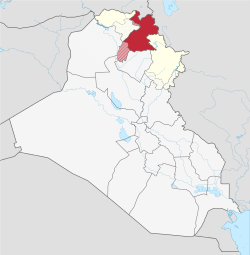You can help expand this article with text translated from the corresponding article in Belarusian. (May 2025)Click [show] for important translation instructions.
|
| 2022 Erbil missile attacks | |
|---|---|
| Part of Iran–Israel proxy conflict | |
 Location of Erbil | |
| Location | Erbil, Kurdistan Region, Iraq |
| Date | 13 March 2022, 1:20 a.m. (local time, UTC+3) |
Attack type | Missile attack |
| Weapons | Fateh-110 |
| Deaths | None (per Kurdish officials) [1] 3 killed (per Iranian media) [2] |
| Injured | 1 civilian (per Kurdish officials) [1] 7 injured (per Iranian media) [2] |
| Perpetrator | |
| Motive | In retaliation to Israeli sabotage operations in Iran [3] |
The 2022 Erbil missile attacks occurred on 13 March 2022 when multiple ballistic missiles were launched by the Iran's Islamic Revolutionary Guard Corps from East Azerbaijan province, Iran, against the city of Erbil in Kurdistan Region, Iraq. [4] [5]
Contents
12 Fateh-110 ballistic missiles were reportedly launched from Iran. [6] The IRGC said that the target was Israel's "strategic center" in Erbil. Kurdish authorities reported that among the places hit by the missiles were the city's American consulate and a residential neighbourhood. One civilian was confirmed injured by the attack by Kurdish officials. [1] According to one US official, the hit targets buildings where a Mossad cell was suspected of operating, according to a conversation with an Iraqi counterpart. [7] [8]
The next day, the Iranian Islamic Revolutionary Guard Corps claimed responsibility for the attack. [9]